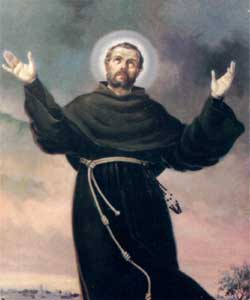Chapter XI
CARE OF THE TONGUE [
Extracted from The Hand that Leads to Heaven by Cardinal Giovanni Bona, 1881. republished by TAN Books under the title Guidance to Heaven.]

On the Care of the Tongue: Its importance and difficulty. What is to be observed and avoided in conversation. How we are to bear the evil tongues of others.
IT IS A matter of as great importance to guard the tongue as it is the pupil of the eye, because "Death and life are in the power of the tongue." (Prov. 18:21). He who cannot govern his tongue is like a city without walls, which is exposed on all sides. Without the grace of God, however, it is next to an impossibility to tame it. Man tames the lion, the bull and the bear, but his tongue he cannot tame. Human nature loves to talk much, as it rejoices to give immediate expression to its desires and conceptions. Moreover, the tongue is fixed near the brain, as the mouth is near the faculty of thought, in order that whatsoever the mind thinks may be quickly conveyed to the organ of speech and published in words. Nature itself has taught you how necessary it is to guard the tongue, since it has placed a double barrier (in the teeth and the lips) before this member. But as the fragrance of the sweet ointment evaporates if the box in which it is kept be left open, so all the vigor of the mind is dissipated when the mouth is not closed. That man forgets himself who is not always mindful of guarding his tongue.
Be prudent in every conversation, suppressing that immoderate inclination which rashly hurries most people on to pass sentence upon their neighbor without due examination and deference to the case in question. Flee far from duplicity and deception, and without any ambiguity or equivocation deliver the pure sentiments of your mind. God has given you the faculty of speech that you may truly and candidly announce things as they really are. Before you speak, consult your conscience—as to whether you be influenced by any evil passion—nor should you permit your tongue to say a word until that influence cease; otherwise, you shall say many things of which you shall afterwards have to repent. You may easily keep silence if you allow no passion to disturb your heart and if you preserve your soul tranquil and serene. Your discourse and your mind ought to be stamped with the same character. If your mind be sound, temperate and composed, your discourse also will be prudent and temperate. If the former be corrupted, the latter will breathe corruption. It is language that reveals to us the character of him who speaks.
Your conversation ought not to be of an idle nature. You ought to be as particular in the choice of your words as you are in that of your food. You examine the bread that you eat; why not do the same with the words you speak, which have often raised greater disturbances in your house than your food has caused in your stomach. Accustom yourself to speak much with yourself and little with others. Wise men have often regretted having spoken, but never having kept silence. Those animals are esteemed more sagacious whose voice is least heard. Talkativeness is the vice of children, and of women in whom reason is not strong. Any man who speaks nothing but vain and useless words has no virtue. If you love God and your salvation, your discourse will be on God, virtue and perfection. Charity is a stranger to falsehood, nor can it disguise itself. Everyone is immersed in the things which he loves, and these form the subject of his conversation. Hence you speak less willingly of divine things because you have not as yet arisen from the dross of your vices. I must add, you ought to read and meditate a little, at least on subjects regarding your salvation. How could matter on this fail you if you wish to speak to yourself? "For out of the abundance of the heart the mouth speaketh." (Matt. 12:34).
Almost every discourse among men turns on the life, morals and pursuits of others; and there are almost as many judges passing sentence upon each one as there are inhabitants in his city. Scarcely does anyone look at home. We are for the most part near-sighted with regard to our own faults, but in discerning those of others, our vision is very good. We throw wide open our doors to receive reproaches against our neighbor, but hardly do we leave a chink open to hear anything in his praise. It behooves us, in places where this vice is more common, to be more careful in avoiding it. You have plenty to do with your own vices—find fault with these and correct them. Do not divulge your own secrets, or those of others which you are obliged to conceal.
Many have fallen into great disputes because they revealed their secrets to imprudent persons to whom they ought not to have confided them. Usually, to tell a thing to one person is the same as telling it to many. A word easily flies from one to another, and from these to all. This arises from the extent of discourse, to which many people fix no just bounds. The pleasure which one feels in conversation insensibly draws him on, and like drunkenness, so occupies the mind that there is no secret so hidden and sacred which may not travel abroad and become public. A man reveals to you his secrets; you in return, having received a pledge of confidence, communicate yours to him. But you perhaps may keep these secrets, while he tells everyone he meets the secret things he has heard, so that everyone knows, under cover of a secret, that of which all were ignorant in public.
You may well say that tongues take wings to fly privately to the ears of all, until the secret extends far on all sides and becomes a report. Whatsoever evil is under Heaven generally owes its origin or advancement to the tongue; therefore, make a balance for your words and a bridle for your mouth. You ought to say nothing of which it would be better to keep a profound silence. Stinginess in words is more praiseworthy than that in money. The man who scatters his money benefits others, while he injures himself; he who lavishes his words injures both himself and others. The person who knows how to hear much and say little approaches near to the Divinity.
Nothing can be secure from the darts of the tongue: It is not arrested by the power of kings nor by the virtue of saints; the one needs not dread the sword, and the other cannot fear censure, yet neither can hide from calumny. Christ Himself, when living among men, did not escape the scourge of the tongue. Imitate Jesus and the Saints in their example of patience. Detraction is both a spur to urge men to the practice of virtue, and a bridle to hold them in the right way.
There is no enemy among the vices more powerful than censure. When anyone speaks ill of you, he teaches you what you ought to avoid. Do you wish to escape the darts of the envenomed tongue? Disdain them. If you observe silence, you shall receive no wound. Esteeming much the judgment of the good, you need not fear the insolence of the calumniator. It concerns you but little what others may think of you; in your own conscience you have a more certain and incorruptible witness. Interrogate your conscience and believe it.
What can be more unworthy of you than to rest your character on the saying of the unwise and to submit it to the judgment of another? It is necessary that you should be good, let others say what they will of you, as if gold or emerald should say, "Whatsoever they may think, it behooves me to be what I am by nature and to preserve my color." If anyone should say injurious words to the limpid fountain, shall it therefore cease to pour out pure water? And if a person should throw dirt into it, does it not presently clear itself, dissipating the filthy matter?
Thus, neither ought you to disturb the calmness of your mind, although the wicked should calumniate and tear you to pieces. To be disturbed at every rumor is to have but little regard for oneself. Children strike with their little hands the mouth of their father; the infant pulls the hair of its mother, gnawing her bosom, tearing her cheeks and spitting on them, and we call none of these things an injury, because he who does them is incapable of conceiving such an act. Do you also entertain the same sentiments for those who calumniate you as parents cherish for their children? If once you let yourself be moved by anger on account of an injury, becoming weak-minded thereby, you honor him who is the cause of it. It is necessary, then, that you should have the glory of being admired by him from whom you could bear to suffer disdain. But this is the vice of a base soul and a little mind. You shall always be unhappy if you imagine yourself despised.
 I am extremely pleased to read that Pope Benedict XVI has called for Vatican Judges to tighten up the criteria in granting annulments. This follows a report that states 69 annulments were granted in 2005 for truly insufficient reasons including husbands being too attached to their mothers! For those new to the term, an "annulment" is declaring a marriage null and void.
I am extremely pleased to read that Pope Benedict XVI has called for Vatican Judges to tighten up the criteria in granting annulments. This follows a report that states 69 annulments were granted in 2005 for truly insufficient reasons including husbands being too attached to their mothers! For those new to the term, an "annulment" is declaring a marriage null and void.










































